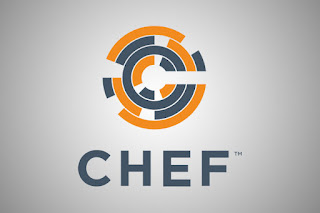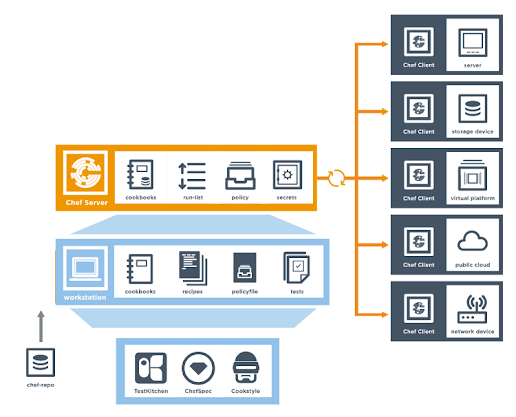21 Chef Interview Questions and Answers for DevOps Engineers
If you are tired of being stressed up with interviews every now and then, you have done the right thing to come here and seek information. You deserve to pass your interview and therefore you should also try your best to avoid failing.
1. What is Chef?
Answer:
Chef is a powerful configuration management tool and automation tool.
It converts the infrastructure of the company into a structured format
of code. Thanks to Chef you can develop scripts that can be used for
automating the IT and business processes.
2. What is the DevOps Life Cycle?
Answer:
DevOps Life Cycle is made up of stages such as Continuous Development,
Integration, Testing, Deployment, and Monitoring. We explain the stages
below.
3. What is the importance of Chef Inspec in compliance with automation?
Answer:
Chef Inspec provides security and compliance rules across security
engineers, operations, and software developers. It enforces consistent
standards in the managed environment and in each stage of development by
running automated tests for compliance, security, and other policy
requirements across servers, containers, and cloud APIs.
4. How is Chef Automate utilized?
Answer:
Chef Automate offers an analytics dashboard for developers, operations,
and security personnel in one place, delivering changes in
infrastructure and applications. It also offers actionable insights on
performance and scaling across multiple data centers and cloud
providers.
5. What are the products offered by Chef for DevOps operations?
Answer: Products offered include:
- Chef Desktop
- Chef Compliance
- Chef Infra
- Chef Habitat
- Chef Inspec
- Chef Automate
6. What is the role of OHAI in Chef?
Answer:
OHAI is a tool that Chef Infra runs and collects system configuration
data used within Cookbooks. It detects common configuration details with
help of built-in plug-in. It also collects attributes from Operating System, Network, Memory, Disk, CPU, Kernel, Hostnames, and Cloud
provider metadata.
7. What are the types of handlers in Chef?
Answer: the three handlers in Chef are as follows:
- Exception Handler
- Start Handler
- Report Handler
8. What is Test Kitchen?
Answer:
Test kitchen is a built-in tool that tests the recipe – (code to
configure an infrastructure), in an isolated environment, for any
potential defects, that may change the production environment. It allows
testing code to configure infrastructure over any platform or operating
system using Chef Inspec.
9. What are the major components of Chef?
Answer:
- Chef Server – You can think of the Chef Server as the central store for that accumulates all the data that is necessary for configuring the nodes.
- Chef Node – The Chef Node can be thought of as a client responsible for sharing data across a network and it is based on the chef-client architecture.
- Chef Workstation – The Chef Workstation can be thought of as the host for modifying the configuration data and cookbooks which are then forwarded to the Chef Server.
10. What is a Chef Node and what is its importance?
Answer:
We can think of the node as a physical server or a virtual machine that
is a constituent of the Chef architecture. You can execute any resource
with Chef.
11. Why are SSL certificates used in Chef?
Answer:
You need the SSL certificate for the initial configuration of the Chef
and for creating the certificate and private keys in Nginx. This ensures
that the right data can be accessed between the Chef Client and Chef
Server.
12. What is the significance of a Signed Header?
Answer:
The Signed Header is needed for the validation of the interaction
between the Chef node, server, and signed header authentication.
13. What is the importance of Chef starter kit?
Answer:
The starter kit is needed for creating the configuration files in Chef.
It gives you the information for interacting with the server and
defining the configuration file. You can easily download the starter kit
and use it at the desired place on the workstation.
14. What is the process for updating a Chef Cookbook?
Answer:
- From the Workstation run the Knife SSH
- Run the SSH and Chef-client on the server directly
- You can use the Chef-client as a daemon for restarting the service as needed.
15. Which command helps in uploading a cookbook to the Chef server?
Answer: The command for uploading a cookbook to the Chef server is “knife cookbook upload”.
16. What is Data Bags in Chef?
Answer:
Data Bags are global variables stored in the form of JSON data. Data
Bags are accessible from Chef Server. The indexing of data bags helps in
easily searching for it or access it through a recipe.
17. How does Chef-apply differ from Chef-client?
Answer:
- Chef-apply is an executable program that runs a single Recipe from the command line. It is a part of the Chef development kit and a great way to explore resources.
- Chef-client applies a Cookbook. It is used for production purposes where you typically run Chef-client to apply one or more cookbooks.
18. What would you set your cookbook’s version to once it is ready to use in production?
Answer:
According to Semantic Versioning, you should set your cookbook’s
version number to 1.0.0 once it is ready to use in production.
19. How does a Cookbook differ from a Recipe in Chef?
Answer:
A Recipe is a collection of Resources, and primarily configures a
software package or some piece of infrastructure. A Cookbook groups
together Recipes and other information in a way that is more manageable
than having just Recipes alone.
20. What is the difference between a recipe and cookbook in Chef?
Answer:
Chef recipe is a combination of resources for configuration of a
software package. Chef recipe is also ideal for configuring a certain
part of the infrastructure. However, a Cookbook is a collection of Chef
Recipes. Also, a Chef cookbook contains supporting information that
improves the ease of configuration management.
21 What is difference between Chef and Puppet?
While both Chef and Puppet is used for server automation, this diagram from Edureka explains the difference between Chef and Puppet clearly:
That's all about the 21 Chef Interview Questions for DevOps Interviews. These questions covers essential Chef concepts and they are great to both learn and revise them. You now
have no reason to worry or complain because you have all you have been
lacking for all this while. Just get out of your comfort zone and be
ready for the interview because this time round you will pass and you
won’t believe it. Your time to grab that success has finally come. Go
for it without hesitation. Wish you the very best.
- 130+ Java Interview Questions with Answers
- Chef Official Documentation
- 40+ Object-Oriented Programming Questions with Answers
- 15 Cyber Security Interview Questions with Answers
- 20 Algorithms Interview Questions for Software Developers
- 20 JUnit Interview Questions with Answers
- 50+ Microsoft SQL Server Phone Interview questions
- 20 PostgreSQL Interview Questions with Answers
- 25+ Spring Security Interview Questions with Answers
- 10 Oracle Interview Questions with Answers
- 17 Java Debugging Interview Questions with Answers
- 30 JavaScript Interview Questions with Answers
- 10 Java Locking and Multithreading questions
- 12 SQL Query Interview questions with solutions
- 20+ Spring Boot Interview Questions with Answers
- 25 Recursion Interview questions with answers
- 50 SQL and Database Interview Questions for Beginners
- 17 Spring AOP Interview Questions with Answers
- 20 Software Design and Pattern Questions from Interviews
- 35 Python Interview Questions for 1 to 2 years experienced





No comments:
Post a Comment
Feel free to comment, ask questions if you have any doubt.